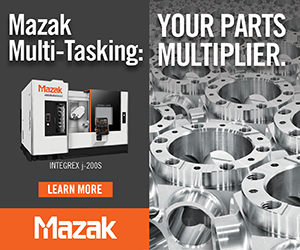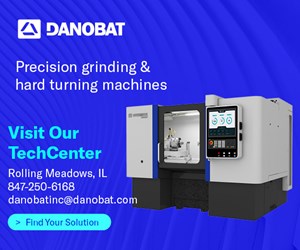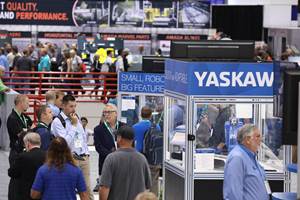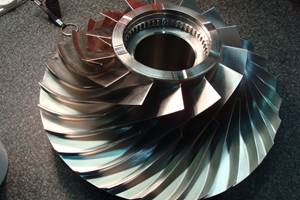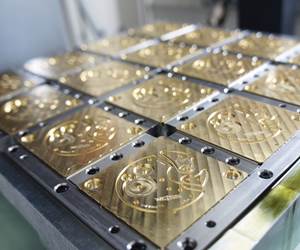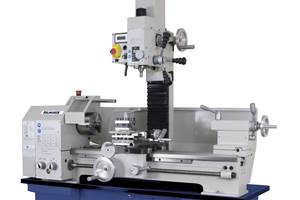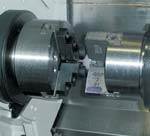Serving The Human Machine
A New Hampshire manufacturer spurs growth by expanding the medical segment of its business.
The American metalworking industry thrives on complexity. As the designs of modern products and systems become more sophisticated, the value of precision in manufacturing processes and resource management increases substantially. The growing demand for highly complex parts not only narrows the competitive field, but it also places a greater premium on maintaining close contacts between manufacturers, suppliers and customers. Because the human body is much more complex than any of the manufactured mechanisms that support modern civilization, these factors are particularly applicable to the business of medical machining.
Producing medical parts is a demanding business that requires strict control of machining processes and a substantial amount of outsourcing. This heightens the importance of maintaining a network of reliable, specialized suppliers to provide services such as plating, heat treatment, electropolishing, passivation and laser marking. To support their continually evolving processes in the shop, manufacturers of medical components also must forge strong partnerships with machine tool suppliers and distributors.
Omni Components Corporation (Hudson, New Hampshire) is an ISO 9001:2000 organization that manufactures parts for various markets including the medical, optical, instrumentation, communications, electronics and commercial high-technology industries. Founded in 1978, the company originally operated cam-type Swiss screw machines, producing components for Braille typewriters. In 1984, as it expanded to serve other clients in New England, Omni purchased its first CNC Swiss-type lathe. Today, Omni provides a full range of multi-axis machining services. In addition to discrete parts, the company also produces various types of turnkey assemblies.
In the past, the telecommunications industry had provided a larger portion of the firm’s business than it does today. Due to poor economic conditions, this segment of Omni’s business declined significantly during the past 2 years. Responding to this situation, the company has simultaneously boosted the percentage of work that it produces in other markets, particularly its medical work. As a result, medical-related parts now represent more than 20 percent of Omni’s overall business.
The impact of this transition has been quite positive for the company. In 2002, while manufacturers in other industries were scaling back or closing, Omni recorded the most successful year in its history. Pursuant to this strong growth, the firm recently consolidated the operations of two separate facilities by relocating to a 32,000 sq. ft. facility in Hudson.
Turning Process Into Profits
Most of the medical parts that Omni manufactures are surgical instruments and bone screws that are machined from bar stock. Dominated by 25 CNC Swiss-style lathes served by bar loaders, Omni’s new production facility has the appearance of a high-tech screw machine shop. The Swiss lathes include B-, F-, L- and M-Series machines supplied by Marubeni Citizen-Cincom Inc. (Allendale, New Jersey).
Besides some waterjet cutting operations and deburring or cleaning of finished parts, the majority of Omni’s medical components are completely machined on the Swiss-style lathes. Equipped with Citizen-Cincom CAV and IEMCA VIP magazine-type bar loaders, the Swiss lathes can operate unattended for extended periods.
“For medical customers, our typical part runs range from 300 to 1,500 pieces,” says Sean Duclos, Omni’s manufacturing manager of turning operations. “We use the Swiss machines’ macro programming capabilities to make changeovers more efficient within families of parts.” Typically, Omni’s most complex parts are run on the newest Swiss lathes because they provide substantially faster cycle speeds. But the shop’s wide range of machines gives Mr. Duclos considerable flexibility in production scheduling. Despite the lathes’ continuous operations, Omni maintains a very clean shop environment by exhausting contaminants through a Trion Air Boss air cleaning system.
Two key elements in Omni’s machining processes are crucial to the company’s productivity. First, Omni uses targeted, high-pressure coolant to provide better chip evacuation, tool durability and surface finishes. Because the Swiss-style lathes perform multiple functions including stop-spindle operations, the positions of parts and the resulting demands for coolant continually change.
Omni’s machine tool distributor, Brookdale Associates Inc. (Agawam, Massachusetts), has provided a solution to this challenge by developing a high-pressure coolant delivery system known as the Cool Blaster HD. Omni’s system provides up to eight independent coolant delivery lines for a single machine. Each coolant line is activated as needed via programming codes during machining. Besides improving cycle times and part quality, this system also reduces tool consumption.
Deep-hole drilling and gundrilling are also required for a significant portion of Omni’s work. In some cases, the company’s drilling applications involve depths as great as 25 times the diameter of the hole. In these high-speed drilling applications, high-pressure coolant delivered through the tools is particularly valuable for chip control and accuracy. Instead of producing long, continuous chips that form “bird nests” around the machine spindles, high-pressure coolant causes the chips to break into small pieces that are readily flushed away.
The second key element in Omni’s manufacturing process is thread whirling. The company uses an innovative version of this technique to improve the production of long bone screws for medical customers. The company uses a thread-whirling head developed by Brookdale Associates that is specifically designed for its Swiss machines. This head enables Omni to produce a finished bone screw from stock-diameter material in a one-shot operation. Because it machines each part close to the guide bushing, the head cannot deflect the workpiece, regardless of length. This process also makes pre-turning operations unnecessary, thus representing a significant improvement to conventional thread turning.
Shopfloor Wizards And A Shop-Wide Brain
Beyond its substantial investment in technology, Omni’s most crucial resources are highly skilled and dedicated employees. “Each of our departments has at least one skilled programmer who programs jobs and trains other department members in proper programming techniques,” says Mr. Duclos. Shopfloor programming also gives the company greater control of evolving conditions. “Having machinists who are capable of programming is advantageous because they also have intimate understandings of what the machines are doing,” says Mr. Duclos. “We always have programmers available on the floor to make necessary adjustments and to improve existing programs.”
Another key element in the company’s production strategy is the Visual Manufacturing system developed by Lilly Software Associates (Hampton, New Hampshire). This enterprise resource planning (ERP) system enables the company to concurrently analyze all of the factors and values that affect production of each type of part. At the engineering stage, all instructions for the manufacturing process of a particular part are entered into the system, and a detailed traveler is generated for each job.
Because this information is available to anyone in the organization, each employee has ready access to an overview of the entire production process. An important benefit of this system is that it breaks down walls in communications between individuals and departments. This addresses problems that may occur as the result of disconnects between different stages in the production process. It also gives each employee the opportunity to provide valuable input for improving the overall manufacturing scheme.
The Visual Manufacturing system monitors specific performance indicators such as compliance with governmental and quality standards, variability in processes or procedures and information about scrap and waste. “Visual software is used throughout our company from quoting and order entry through shipping,” says Omni’s senior manufacturing and sales engineer, Michael Duval. The system integrates estimating, vendor data, cost accounting and delivery schedules into a unified profile of each job. “Instead of using many different procedures to monitor quality, manufacturing and materials, we now use one set of procedures,” he says. “We’re able to streamline the learning process and to always have information at hand when we need it.”
What Medical Customers Want
In addition to requiring extensive documentation of manufacturing processes, strict management of product flow and certification of suppliers, today’s medical customers make further demands on metalworking firms. In this regard, Omni’s president Rick Holka, says, “Medical industry clients want to deal with firms that can offer turnkey capabilities. Our clients expect us to take parts to ever-higher levels of completion, and they’re also asking us to assume greater responsibilities in the engineering realm.”
As a result, today’s medical customer demands more input from the manufacturer at earlier stages in the design process. Companies in the medical machining field, therefore, must have the capabilities to become active partners in their clients’ businesses. This demands a mastery of process control, supply chain issues and enterprise management. It’s a complex endeavor that reflects the contemporary trend in manufacturing toward providing customers with complete and integrated solutions. Within this complexity, however, reside competitive advantages that continue to be exploited by successful American manufacturers.
Related Content
Building an Automation Solution From the Ground Up
IMTS 2022 provides visitors the opportunity to meet with product experts to design automation solutions from scratch.
Read MoreWhen Organic Growth in Your Machine Shop Isn’t Enough
Princeton Tool wanted to expand its portfolio, increase its West Coast presence, and become a stronger overall supplier. To accomplish all three goals at once, acquiring another machine shop became its best option.
Read MoreWatchmaking: A Machinist’s View
Old-world craftsmanship combines with precision machining on a vertical machining center and Swiss-type lathe to produce some of the only U.S.-made mechanical wristwatch movements.
Read MorePalmgren Launches Combination Bench Lathe, Mill
The 11" bench engine lathe and gear head mill is able to handle a wide range of turning, milling and drilling operations typically found on much larger machinery.
Read MoreRead Next
Merging Functions For Better Efficiency
By eliminating extra steps, a multi-process machine enables a medical manufacturer to streamline its production time and conserve shop space.
Read More3 Mistakes That Cause CNC Programs to Fail
Despite enhancements to manufacturing technology, there are still issues today that can cause programs to fail. These failures can cause lost time, scrapped parts, damaged machines and even injured operators.
Read More.jpg;maxWidth=970;quality=90)
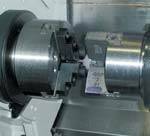



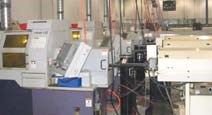
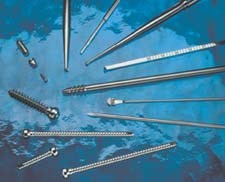
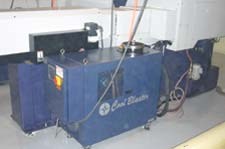
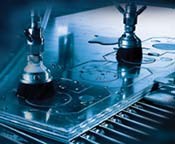
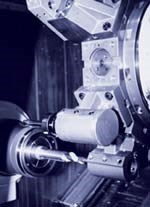
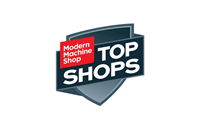

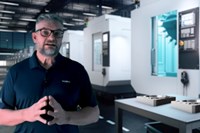

.jpg;maxWidth=300;quality=90)




